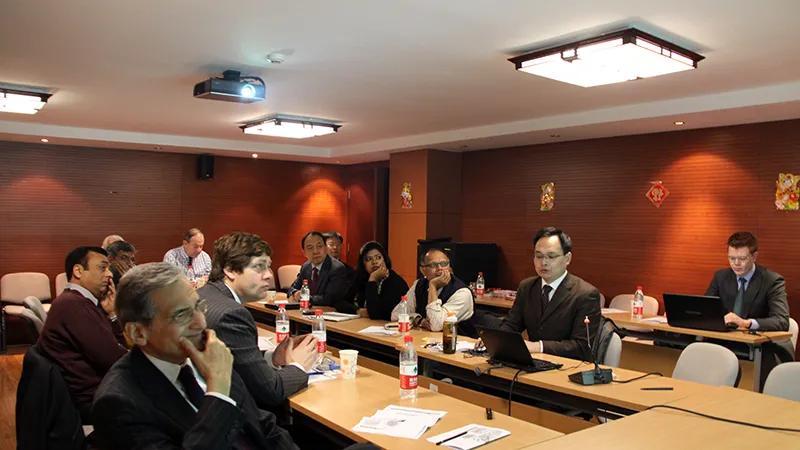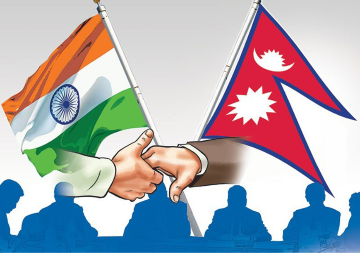A two-day deliberations by 20 experts from India, China and U.K, have underlined the need for a collective regional action to ensure environmental security in South Asia. The meeting was organised by Observer Research Foundation in collaboration with Royal United Services Institute, London and Chinese Academy of Social Sciences, Beijing.

A two-day deliberations by 20 experts from India, China and U.K, have underlined the need for a collective regional action to ensure environmental security in South Asia.
The meeting on "Environmental Security in South Asia", organised in Beijing from 19th-22 nd March by Observer Research Foundation in collaboration with Royal United Services Institute, London and Chinese Academy of Social Sciences, Beijing, also stressed on the need for a paradigm shift from state-centred security towards human security.
It was agreed that real political choices, moving away from emotional and defensive stance, need to be made in order to grapple with climate change and sustainability. De-securitization through knowledge sharing and collaborative governance will improve responsiveness towards the changing climate.
Furthermore, putting market forces in the frontline to resolve resource related conflicts may work towards more effective cooperative arrangements and alliances. A non-traditional approach to develop capacities for knowledge sharing, including training the armed forces towards good environmental practices is crucial.
Most importantly, it was agreed that sociology of communication needs to be revisited to enhance shared understanding of local, regional and global issues in the face of environmental, social and economic realities.
The meeting was organised to explore the potential security impacts of the changing climate and its management in China and India. The Inter-governmental Panel on Climate Change Report in 2007 has said that ’Climate change will adversely affect everything ranging from economic growth to social stability’. Since then, climate change security has received increased attention in both policy and academic debates. In South Asia, climate security has also come to the fore of some domestic management agendas in the past decade, particularly associated with water management, food and energy security.
The framing of climate security has become more diverse, expanding from an initial focus on resource availability and access to include quality, human health and ecosystem requirements, said the experts. However, in South Asia, the term has an explicit focus on geopolitical security concerns. Consequently, violent conflicts and environmental degradation have been linked together, giving rise to ’geo-climate’, moving to and fro between resource, environment and traditional security. In effect, it was realised that perhaps no one definition is broad enough to capture the complexity of climate-related issues.
The relatively large focus on geopolitical security framework of climate change raised important conceptual issues for climate analysts and managers in both India and China.
The logic of securitization was discussed in detail. Increased attention, effectiveness and prompt actions argued in favour of securitization. On the other hand, secrecy, centralization, failed institutional mechanisms and delusion of issues of sovereignty under climate security discussions, set the motion against securitization.
Notwithstanding, the perplexity of distinction between private resources and global common resources has led to securitization of resources and climate change in South Asia.
Furthermore, dilemma towards climate change negotiations, in case of China, was suggested to be attributed to domestic constraints such as socio-economic development objectives, urbanization, and energy security. The Chinese growth strategies highlight the efforts to mitigate adverse impacts of climate change. For instance, their Five Year Plan targets reducing energy intensity, decreasing water consumption and promoting effectiveness of irrigation water.
One of the imperatives to climate change mitigation, technology transfers, was discussed in detail for its practicality and limitations. Reducing high dependency of India and China on foreign low carbon technology was agreed to be critically important. In effect, it was suggested that research and innovation was required to be laid emphasis on for further technological advancement in the field. However, it was also established that mitigation technologies at present and the ones under development can’t be relied upon to be the only solution, unless there is a break-through in climate science. Moreover, technologies have a limited capacity to manage vulnerabilities and climate-related disasters and therefore, shouldn’t be put in the forefront of negotiations and cooperative frameworks.
The question of vulnerabilities, ’whose climate and whose security is it anyways?’ directed the discussion towards micro-level issues. The Indian case studies on Hooghly River and Kosi Barrage showed that controlling, manufacturing and modifying the natural courses of ecosystem, causes irreversible damage to the environment. Management of flows and flushes, land and sewage needs to take the related costs and externalities into account. The best learning can come from the ’vulnerable’ who have survived the worst.
Involving them in policy processes and practice is, therefore, imperative for any climate change mitigation strategies.
One such effort was presented by the Indian side. The use of Information and communication technologies (ICTs), for exchanging traditional knowledge and experiences at multiple levels, has the potential to open communication channels for more informed decision-making. Besides communication, the ICTs were shown to be effective in techno-managerial processes of resource management (For e.g. Smart Water Monitoring Systems).
However, the divergence between different framing of climate change security sparked the debate over the appropriate analytical approach to deal with the underlined micro and macro-issues. It was noted that there are two dominant framework of analysis for climate change, one, environmental risk principles and two, sustainability principles. Overall, the current framing can be categorized as a supply-side management issue, which needs to be re-defined.
The nine-member Indian delegation included Samir Saran, Vice President, Observer Research Foundation, Mukul Sanwal, Member of Expert Committee on Climate Change, Ministry of Science and Technology, Government of India, Manoj Kumar, Group Captain, Indian Airforce, Rajiv Tikoo, Director, OneWorld South Asia, A.K Roy, Chairperson, Hazard Center, Rohan D’Souza, Assistant Professor, Center for Science Policy, Jawaharlal University, Lydia Powell, Senior Fellow, Observer Research Foundation, Mahima Kaul, Director, The Open Communication Foundation, Sonali Mittra, Junior Fellow, Observer Research Foundation. The Chinese delegation included five scholars and the UK side four scholars. There were also five observers.
"U.S Rebalance to Asia"
Mr. Samir Saran also delivered a talk on "U.S Rebalance to Asia" at the Carnegie-Tsinghua Center, Beijing, with representations from nine educational institutions from China. The talk centered on Indo-China cooperation imperatives. He stressed on the need to develop new security arrangement for Asia and its waters and rule-based governance systems.
(This report was prepared by Sonali Mittra, Junior Fellow, Observer Research Foundation)
The views expressed above belong to the author(s). ORF research and analyses now available on Telegram! Click here to access our curated content — blogs, longforms and interviews.




 PREV
PREV

